The
New York Times Book Review released its list of the
10 Best Books of 2010 early last month and now you can find almost all of the celebrated tomes right here at Snell Library! Most of the books on the list are available at
The Hub, our library’s special, rotating selection of international bestsellers, groundbreaking graphic novels, and popular DVDs that you can find immediately across from the Snell Library entrance. Check out the list below to learn more about the 2010 picks and where to find them at Snell. Get ready for a good read while the snow piles up outside!
Fiction
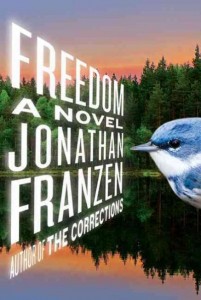 Freedom
Freedom
By Jonathan Franzen
PS3556.R352 F74 2010
Touted by critics as a “masterpiece of American Literature,” and compared in
Esquire magazine to Tolstoy’s classic
War and Peace,
Freedom is a darkly written comedy framed through the envious eyes of an American family’s moralistic neighbors. The book paints an insightful portrait of the cultural forces and individual choices that can bring families together—and tear them apart. Selected for several book lists,
Freedom was not without controversy. Boston’s WBUR reported that several best-selling female authors, including Jodi Picoult, believed the critical praise for Franzen’s book was merely misplaced gender bias. Check out
Freedom for yourself to discover if the book is worth the wide acclaim.
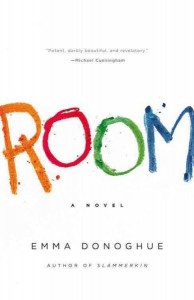 Room
Room
By Emma Donoghue
PR6054.O547 R66 2010
Jack, like other five-year-old boys, plays with his toys and loves his mom, but he lives a life quite different from other children. He has spent his entire life in a small room with his mother as a prisoner of a man called Old Nick. Despite the disturbing premise,
Room is a story of endurance, filled with raw emotional extremes that make readers feel like they too are discovering the world for the first time. Winner of the Hughes & Hughes Irish Novel of the Year and the Rogers Writers’ Trust Fiction Prize,
Room is a strange but powerful novel.
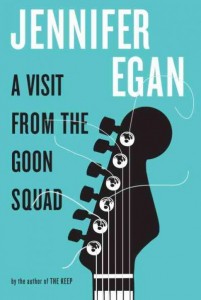 A Visit from the Goon Squad
A Visit from the Goon Squad
By Jennifer Egan
PS3555.G292 V57 2010
Punk rock laced with obscenities? Sign us up, please. Jennifer Egan’s book starts in modern day New York before flashing back to the early Bay Area punk scene to follow the life of Sasha, a child of a broken, violent marriage who runs away and ends up in the radically new music scene of the late 1970s and early ’80s.
A Visit from the Goon Squad is more than just sex and rock and roll—it’s rich with satire and clever prose. Pick up the book today to give this Brooklyn-based author a spin on the turntable.
Non-fiction
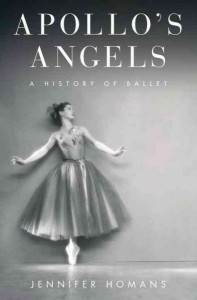 Apollo’s Angels: A History of Ballet
Apollo’s Angels: A History of Ballet
By Jennifer Homans
GV1787 .H58 2010
Homans, former professional ballet dancer and current dance critic for
The New Republic, chronicles the formal and cultural history of ballet in her two-part work
Apollo’s Angels. It is partly a celebration of the ballet’s most notable achievements and its cultural importance, but Homans also questions its survival as its relevance gradually fades. Written before
Black Swan revived the public’s interest in ballet, it’s a fascinating exposition of a purportedly languishing art form.
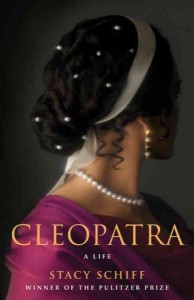 Cleopatra: A Life
Cleopatra: A Life
By Stacy Schiff
DT92.7 .S35 2010
Countless literary and film portrayals present Cleopatra as a bold, manipulative seductress, but they neglect to credit her as a brilliant politician and leader, according to author Stacy Schiff. The author, who won a Pulitzer Prize in 2000 for her biography of Vera Nabokov, the wife of
Lolita author Vladimir Nabokov, dispels the myths surrounding the legendary queen of Egypt while also crafting a “bloody and harrowing” portrait of the royal family.
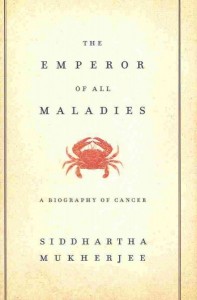 The Emperor of All Maladies: A Biography of Cancer
The Emperor of All Maladies: A Biography of Cancer
By Siddhartha Mukherjee
RC275 .M85 2010
In his debut work, oncologist Siddhartha Mukherjee writes a “biography” of one of our time’s most pervasive and misunderstood illnesses: cancer. It provides detailed accounts of our society’s battle against the disease and the gripping stories behind the treatments and breakthroughs we know today. Mukherjee shows us how far we have come in understanding this “emperor of all maladies,” but he also recognizes how little we actually know.
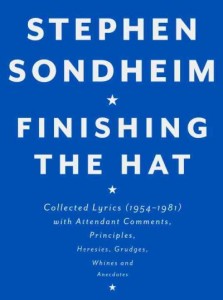 Finishing the Hat: Collected Lyrics (1954-1981) With Attendant Comments, Principles, Heresies, Grudges, Whines and Anecdotes
Finishing the Hat: Collected Lyrics (1954-1981) With Attendant Comments, Principles, Heresies, Grudges, Whines and Anecdotes
By Stephen Sondheim
ML54.6.S69 S66 2010
Finishing the Hat, which is part self-critique and part illumination, analyzes lyricist Stephen Sondheim’s earlier works, including
West Side Story,
A Funny Thing Happened on the Way to the Forum, and
Sweeney Todd. The title refers to a line from Sondheim’s 1984 musical
Sunday in the Park with George, where painter Georges Seurat is moments away from completing his grand work, “
A Sunday Afternoon on the Island of La Grande Jatte.”
Finishing the Hat provides great insight into the creative process of our generation’s most gifted composers.
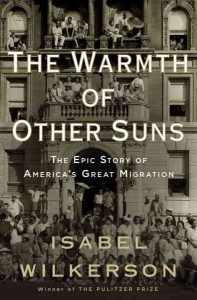 The Warmth of Other Suns: The Epic Story of America’s Great Migration
The Warmth of Other Suns: The Epic Story of America’s Great Migration
By Isabel Wilkerson
E185.6 .W685 2010
When George Swanson Sterling, an orange grove worker in Florida, became aware he was a potential lynching victim, he fled the area for Harlem in 1945. Beginning in the 20th century and peaking in the post-WWII years, more than six million African Americans left the South to escape Jim Crow–era brutality for areas with industrial job opportunities. Wilkerson, a Pulitzer Prize–winning journalist, culminates fourteen years of research in her work,
The Warmth of Other Suns. She details the journeys of three individuals who made the trek from the American South to Wisconsin, California, and New York, respectively. Sterling’s story and others’ provide fascinating insight into the historical migration that shaped and enriched the culture of our major urban areas in the North and West, and consequently, our country.
 Freedom
By Jonathan Franzen
PS3556.R352 F74 2010
Touted by critics as a “masterpiece of American Literature,” and compared in Esquire magazine to Tolstoy’s classic War and Peace, Freedom is a darkly written comedy framed through the envious eyes of an American family’s moralistic neighbors. The book paints an insightful portrait of the cultural forces and individual choices that can bring families together—and tear them apart. Selected for several book lists, Freedom was not without controversy. Boston’s WBUR reported that several best-selling female authors, including Jodi Picoult, believed the critical praise for Franzen’s book was merely misplaced gender bias. Check out Freedom for yourself to discover if the book is worth the wide acclaim.
Freedom
By Jonathan Franzen
PS3556.R352 F74 2010
Touted by critics as a “masterpiece of American Literature,” and compared in Esquire magazine to Tolstoy’s classic War and Peace, Freedom is a darkly written comedy framed through the envious eyes of an American family’s moralistic neighbors. The book paints an insightful portrait of the cultural forces and individual choices that can bring families together—and tear them apart. Selected for several book lists, Freedom was not without controversy. Boston’s WBUR reported that several best-selling female authors, including Jodi Picoult, believed the critical praise for Franzen’s book was merely misplaced gender bias. Check out Freedom for yourself to discover if the book is worth the wide acclaim.
 Room
By Emma Donoghue
PR6054.O547 R66 2010
Jack, like other five-year-old boys, plays with his toys and loves his mom, but he lives a life quite different from other children. He has spent his entire life in a small room with his mother as a prisoner of a man called Old Nick. Despite the disturbing premise, Room is a story of endurance, filled with raw emotional extremes that make readers feel like they too are discovering the world for the first time. Winner of the Hughes & Hughes Irish Novel of the Year and the Rogers Writers’ Trust Fiction Prize, Room is a strange but powerful novel.
Room
By Emma Donoghue
PR6054.O547 R66 2010
Jack, like other five-year-old boys, plays with his toys and loves his mom, but he lives a life quite different from other children. He has spent his entire life in a small room with his mother as a prisoner of a man called Old Nick. Despite the disturbing premise, Room is a story of endurance, filled with raw emotional extremes that make readers feel like they too are discovering the world for the first time. Winner of the Hughes & Hughes Irish Novel of the Year and the Rogers Writers’ Trust Fiction Prize, Room is a strange but powerful novel.
 A Visit from the Goon Squad
By Jennifer Egan
PS3555.G292 V57 2010
Punk rock laced with obscenities? Sign us up, please. Jennifer Egan’s book starts in modern day New York before flashing back to the early Bay Area punk scene to follow the life of Sasha, a child of a broken, violent marriage who runs away and ends up in the radically new music scene of the late 1970s and early ’80s. A Visit from the Goon Squad is more than just sex and rock and roll—it’s rich with satire and clever prose. Pick up the book today to give this Brooklyn-based author a spin on the turntable.
Non-fiction
A Visit from the Goon Squad
By Jennifer Egan
PS3555.G292 V57 2010
Punk rock laced with obscenities? Sign us up, please. Jennifer Egan’s book starts in modern day New York before flashing back to the early Bay Area punk scene to follow the life of Sasha, a child of a broken, violent marriage who runs away and ends up in the radically new music scene of the late 1970s and early ’80s. A Visit from the Goon Squad is more than just sex and rock and roll—it’s rich with satire and clever prose. Pick up the book today to give this Brooklyn-based author a spin on the turntable.
Non-fiction
 Apollo’s Angels: A History of Ballet
By Jennifer Homans
GV1787 .H58 2010
Homans, former professional ballet dancer and current dance critic for The New Republic, chronicles the formal and cultural history of ballet in her two-part work Apollo’s Angels. It is partly a celebration of the ballet’s most notable achievements and its cultural importance, but Homans also questions its survival as its relevance gradually fades. Written before Black Swan revived the public’s interest in ballet, it’s a fascinating exposition of a purportedly languishing art form.
Apollo’s Angels: A History of Ballet
By Jennifer Homans
GV1787 .H58 2010
Homans, former professional ballet dancer and current dance critic for The New Republic, chronicles the formal and cultural history of ballet in her two-part work Apollo’s Angels. It is partly a celebration of the ballet’s most notable achievements and its cultural importance, but Homans also questions its survival as its relevance gradually fades. Written before Black Swan revived the public’s interest in ballet, it’s a fascinating exposition of a purportedly languishing art form.
 Cleopatra: A Life
By Stacy Schiff
DT92.7 .S35 2010
Countless literary and film portrayals present Cleopatra as a bold, manipulative seductress, but they neglect to credit her as a brilliant politician and leader, according to author Stacy Schiff. The author, who won a Pulitzer Prize in 2000 for her biography of Vera Nabokov, the wife of Lolita author Vladimir Nabokov, dispels the myths surrounding the legendary queen of Egypt while also crafting a “bloody and harrowing” portrait of the royal family.
Cleopatra: A Life
By Stacy Schiff
DT92.7 .S35 2010
Countless literary and film portrayals present Cleopatra as a bold, manipulative seductress, but they neglect to credit her as a brilliant politician and leader, according to author Stacy Schiff. The author, who won a Pulitzer Prize in 2000 for her biography of Vera Nabokov, the wife of Lolita author Vladimir Nabokov, dispels the myths surrounding the legendary queen of Egypt while also crafting a “bloody and harrowing” portrait of the royal family.
 The Emperor of All Maladies: A Biography of Cancer
By Siddhartha Mukherjee
RC275 .M85 2010
In his debut work, oncologist Siddhartha Mukherjee writes a “biography” of one of our time’s most pervasive and misunderstood illnesses: cancer. It provides detailed accounts of our society’s battle against the disease and the gripping stories behind the treatments and breakthroughs we know today. Mukherjee shows us how far we have come in understanding this “emperor of all maladies,” but he also recognizes how little we actually know.
The Emperor of All Maladies: A Biography of Cancer
By Siddhartha Mukherjee
RC275 .M85 2010
In his debut work, oncologist Siddhartha Mukherjee writes a “biography” of one of our time’s most pervasive and misunderstood illnesses: cancer. It provides detailed accounts of our society’s battle against the disease and the gripping stories behind the treatments and breakthroughs we know today. Mukherjee shows us how far we have come in understanding this “emperor of all maladies,” but he also recognizes how little we actually know.
 Finishing the Hat: Collected Lyrics (1954-1981) With Attendant Comments, Principles, Heresies, Grudges, Whines and Anecdotes
By Stephen Sondheim
ML54.6.S69 S66 2010
Finishing the Hat, which is part self-critique and part illumination, analyzes lyricist Stephen Sondheim’s earlier works, including West Side Story, A Funny Thing Happened on the Way to the Forum, and Sweeney Todd. The title refers to a line from Sondheim’s 1984 musical Sunday in the Park with George, where painter Georges Seurat is moments away from completing his grand work, “A Sunday Afternoon on the Island of La Grande Jatte.” Finishing the Hat provides great insight into the creative process of our generation’s most gifted composers.
Finishing the Hat: Collected Lyrics (1954-1981) With Attendant Comments, Principles, Heresies, Grudges, Whines and Anecdotes
By Stephen Sondheim
ML54.6.S69 S66 2010
Finishing the Hat, which is part self-critique and part illumination, analyzes lyricist Stephen Sondheim’s earlier works, including West Side Story, A Funny Thing Happened on the Way to the Forum, and Sweeney Todd. The title refers to a line from Sondheim’s 1984 musical Sunday in the Park with George, where painter Georges Seurat is moments away from completing his grand work, “A Sunday Afternoon on the Island of La Grande Jatte.” Finishing the Hat provides great insight into the creative process of our generation’s most gifted composers.
 The Warmth of Other Suns: The Epic Story of America’s Great Migration
By Isabel Wilkerson
E185.6 .W685 2010
When George Swanson Sterling, an orange grove worker in Florida, became aware he was a potential lynching victim, he fled the area for Harlem in 1945. Beginning in the 20th century and peaking in the post-WWII years, more than six million African Americans left the South to escape Jim Crow–era brutality for areas with industrial job opportunities. Wilkerson, a Pulitzer Prize–winning journalist, culminates fourteen years of research in her work, The Warmth of Other Suns. She details the journeys of three individuals who made the trek from the American South to Wisconsin, California, and New York, respectively. Sterling’s story and others’ provide fascinating insight into the historical migration that shaped and enriched the culture of our major urban areas in the North and West, and consequently, our country.
The Warmth of Other Suns: The Epic Story of America’s Great Migration
By Isabel Wilkerson
E185.6 .W685 2010
When George Swanson Sterling, an orange grove worker in Florida, became aware he was a potential lynching victim, he fled the area for Harlem in 1945. Beginning in the 20th century and peaking in the post-WWII years, more than six million African Americans left the South to escape Jim Crow–era brutality for areas with industrial job opportunities. Wilkerson, a Pulitzer Prize–winning journalist, culminates fourteen years of research in her work, The Warmth of Other Suns. She details the journeys of three individuals who made the trek from the American South to Wisconsin, California, and New York, respectively. Sterling’s story and others’ provide fascinating insight into the historical migration that shaped and enriched the culture of our major urban areas in the North and West, and consequently, our country.